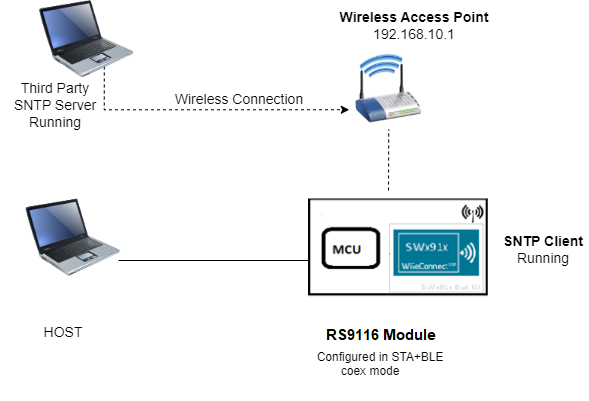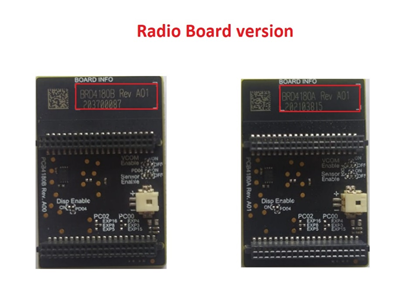SNTP Client#
1. Purpose / Scope#
This application demonstrates how Silicon Labs device gets info from SNTP server. In this application, Silicon Labs device connects to Access Point in client mode and connects to SNTP server. After successful connection with SNTP server, application gets time and date info from SNTP server.
2. Prerequisites / Setup Requirements#
Before running the application, set up the following:
2.1 Hardware Requirements#
Windows PC with Host interface (UART / SPI/ SDIO).
Silicon Labs RS9116 Wi-Fi Evaluation Kit
Host MCU Eval Kit. This example has been tested with:
Silicon Labs WSTK + EFR32MG21
Silicon Labs WSTK + EFM32GG11
Wireless Access Point


2.2 Software Requirements#
Embedded Development Environment
For STM32, use licensed Keil IDE
For Silicon Labs EFx32, use the latest version of Simplicity Studio
2.3 Project Setup#
SoC Mode
Silicon Labs SiWx91x SoC. Follow the Getting Started with SiWx91x SoC to setup the example to work with SiWx91x SoC and Simplicity Studio.
NCP Mode
Silicon Labs EFx32 Host. Follow the Getting Started with EFx32 to setup the example to work with EFx32 and Simplicity Studio.
STM32F411 Host. Follow the Getting Started with STM32 to setup the example to work with STM32 and Keil.
3. Application Build Environment#
3.1 Platform#
The Application can be built and executed on below Host platforms
3.2 Host Interface#
By default, the application is configured to use the SPI bus for interfacing between Host platforms (STM32F411 Nucleo / EFR32MG21) and the RS9116W EVK.
The SAPI driver provides APIs to enable other host interfaces if SPI is not suitable for your needs.
3.3 Project Configuration#
The Application is provided with the project folder containing Keil and Simplicity Studio project files.
Keil Project
The Keil project is used to evaluate the application on STM32.
Project path:
<Release_Package>/examples/snippets/wlan/sntp_client_v6/projects/sntp_client_v6-nucleo-f411re.uvprojx
Simplicity Studio
The Simplicity Studio project is used to evaluate the application on EFR32MG21.
Project path:
If the Radio Board is BRD4180A or BRD4181A, then access the path
<Release_Package>/examples/snippets/wlan/sntp_client_v6/projects/sntp_client_v6-brd4180a-mg21.slsprojIf the Radio Board is BRD4180B or BRD4181B, then access the path
<Release_Package>/examples/snippets/wlan/sntp_client_v6/projects/sntp_client_v6-brd4180b-mg21.slsprojUser can find the Radio Board version as given below


3.4 Bare Metal Support#
This application supports only bare metal environment. By default, the application project files (Keil and Simplicity studio) are provided with bare metal configuration in the release package.
4. Application Configuration Parameters#
The application can be configured to suit user requirements and development environment. Read through the following sections and make any changes needed.
4.1 Open rsi_sntp_client_app.c file#
4.1.1 User must update the below parameters#
SSID refers to the name of the Access point.
#define SSID "SILABS_AP"CHANNEL_NO refers to the channel in which device should scan. If it is 0, device will scan all channels
#define CHANNEL_NO 0SECURITY_TYPE refers to the type of security. In this application STA supports Open, WPA-PSK, WPA2-PSK securities.
Valid configuration is:
RSI_OPEN - For OPEN security mode
RSI_WPA - For WPA security mode
RSI_WPA2 - For WPA2 security mode
#define SECURITY_TYPE RSI_WPA2PSK refers to the secret key if the Access point configured in WPA-PSK /WPA2-PSK security modes.
#define PSK "1234567890"SERVER_IP_ADDRESS refers remote SNTP Server IPv6 address to connect.
#define SERVER_IP "2001:db8:0:1::121"Configure the SNTP method to use the server
#define SNTP_METHOD RSI_SNTP_UNICAST_MODESNTP time out value to use
#define SNTP_TIMEOUT 50Application memory length which is required by the driver
#define GLOBAL_BUFF_LEN 150004.1.2 The desired parameters are provided below. User can also modify the parameters as per their needs and requirements.#
To configure IP address DHCP_MODE refers whether IP address configured through DHCP or STATIC
#define DHCP_MODE 1Note!
If the user wants to configure the STA IP address through DHCP then set DHCP_MODE to "1" and skip configuring the following DEVICE_IP6, and GATEWAY6 macros Otherwise set the DHCP_MODE macro to "0" and configure the following DEVICE_IP6 and GATEWAY6 macros.
IPv6 address to be configured to the device
Example: To configure "2001:db8:0:1::121" as IP address, update the macro DEVICE_IP6 as below
#define DEVICE_IP6 "2001:db8:0:1::121"
IP address of the gateway
Example: To configure "2001:db8:0:1::121" as Gateway, update the macro GATEWAY6 as below
```c
#define GATEWAY6 "2001:db8:0:1::121"4.2 Open rsi_wlan_config.h file. User can also modify the below parameters as per their needs and requirements.#
#define CONCURRENT_MODE RSI_DISABLE
#define RSI_FEATURE_BIT_MAP FEAT_SECURITY_OPEN
#define RSI_TCP_IP_BYPASS RSI_DISABLE
#define RSI_TCP_IP_FEATURE_BIT_MAP (TCP_IP_FEAT_DHCPV4_CLIENT | TCP_IP_FEAT_SNTP_CLIENT | TCP_IP_FEAT_DHCPV6_CLIENT | TCP_IP_FEAT_IPV6)
#define RSI_CUSTOM_FEATURE_BIT_MAP FEAT_CUSTOM_FEAT_EXTENTION_VALID
#define RSI_EXT_CUSTOM_FEAT_BIT_MAP EXT_FEAT_256k_MODE
#define RSI_BAND RSI_BAND_2P4GHZ5. Testing the Application#
Follow the steps below for the successful execution of the application.
5.1 Loading the RS9116W Firmware#
Refer Getting started with a PC to load the firmware into RS9116W EVK.
The firmware file is located in <SDK>/firmware/
5.2 Building the Application on Host Platform#
5.2.1 Using STM32#
Refer Getting started with STM32
Open the project
<SDK>/examples/snippets/wlan/sntp_client_v6/projects/sntp_client_v6-nucleo-f411re.uvprojxBuild and Debug the project
Check for the RESET pin:
If RESET pin is connected from STM32 to RS9116W EVK, then user need not press the RESET button on RS9116W EVK before free run.
If RESET pin is not connected from STM32 to RS9116W EVK, then user need to press the RESET button on RS9116W EVK before free run.
Add the macro RSI_CONFIGURE_IPV6=1 in the preprocessor settings (Project -> Options for Target -> C/C++ -> Preprosessor Symbols)
Free run the project
Then continue the common steps from 5.3
5.2.2 Using EFX32#
Refer Getting started with EFX32, for settin-up EFR & EFM host platforms
Open Simplicity Studio and import the EFR32/EFM32 project from
<SDK>/examples/snippets/wlan/sntp_client/projectsSelect the appropriate .slsproj as per Radio Board type mentioned in Section 3.3 for EFR32 board. (or)
Select the *.brd2204a-gg11.slsproj for EFM32GG11 board.
Compile and flash the project in to Host MCU
Debug the project
Check for the RESET pin:
If RESET pin is connected from STM32 to RS9116W EVK, then user need not press the RESET button on RS9116W EVK before free run
If RESET pin is not connected from STM32 to RS9116W EVK, then user need to press the RESET button on RS9116W EVK before free run
Add the macro RSI_CONFIGURE_IPV6=1 in the preprocessor settings to enable IPv6 (Project -> Properties -> C/C++ Build -> Settings ->GNU ARM C Compiler ->Preprosessor)
Free run the project
Then continue the common steps from 5.3
5.3 Common Steps#
Configure the Access point (internet AP) in OPEN / WPA-PSK / WPA2-PSK mode in order to connect Silicon Labs device in STA mode.
Connect to SNTP server and request server for information.
After the program gets executed, Silicon Labs device would be connected to access point and gets IP.
After successful connection with access point, device starts connection with the SNTP server.
After successful connection, module will send request to the server for time,date and Server details.
Application gets all the information requested.
Analyze the sniffer capture for NTP server response which contains date and time.
Compressed Debug Logging#
To enable the compressed debug logging feature please refer to Logging User Guide
